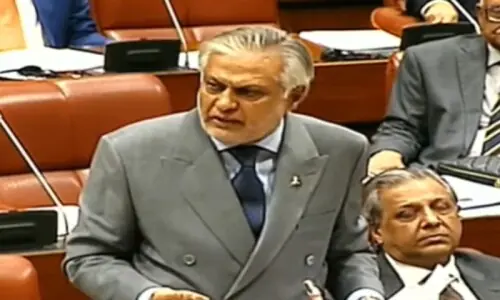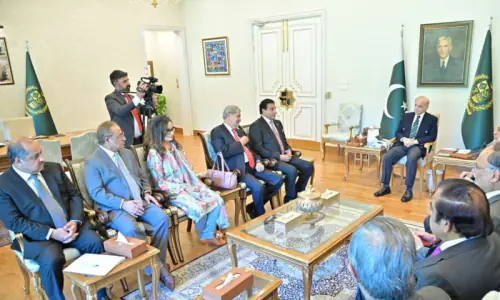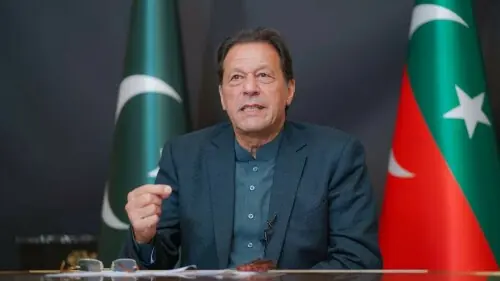• FO spokesperson says non-interference in domestic matters cornerstone of Pak-US ties
• Believes change in US administration will not affect ties with China, terms relations with Beijing source of stability
• Dismisses talk of pressure for Imran’s release as speculative
ISLAMABAD: The Foreign Office on Thursday emphasised that ‘non-interference’ should be the cornerstone of Pakistan-United States ties, expressing the hope for a strengthened relationship under the Trump administration.
Speaking at the weekly media briefing, Foreign Office Spokesperson Mumtaz Zahra Baloch commented on Donald Trump’s victory in the US presidential election. She conveyed that Pakistan anticipated its longstanding ties with the US to “further strengthen and broaden” across all sectors under the new leadership.
Ms Baloch noted that President Asif Ali Zardari, Prime Minister Shehbaz Sharif, and Deputy Prime Minister and Foreign Minister Ishaq Dar had already congratulated Donald Trump on his election as the 47th President of the United States. She highlighted Pakistan’s desire for fruitful and mutually beneficial cooperation with the US.
Addressing claims that Mr Trump would, upon taking office, pressure Pakistan on domestic matters, such as the release of jailed former prime minister Imran Khan, she dismissed these suggestions as “speculative”.
These claims have been largely promoted by the PTI’s US chapter, which actively supported Trump’s campaign in hopes of securing his support for Imran Khan’s release.
The PTI previously accused the Biden administration of colluding with elements within Pakistan to dismiss his government in 2022 — a claim the outgoing administration consistently denied.
“Pakistan and the United States are old friends and partners, and we will continue to pursue our relationship based on mutual respect, confidence, and non-interference in each other’s domestic affairs,” she asserted.
Although the Biden administration did not respond to requests from US Congressional leaders for pressing Islamabad for the release of political prisoners in Pakistan, it did express concern about alleged irregularities in Pakistan’s elections earlier this year and called for a transparent investigation.
Islamabad viewed a US House of Representatives resolution passed in June, which called for a “full and independent” investigation into alleged election irregularities, as an attempt to “interfere” in its internal affairs.
Relationship with China
The FO spokesperson further affirmed that Mr Trump’s return to the presidency would not impact Pakistan’s close relationship with its ally, China.
Ms Baloch emphasised that Pakistan-China relations have historically been unaffected by international developments, adding that a “domestic development in another country” would likely not alter this dynamic.
She described Pakistan’s relationship with China as “all-weather”, “strategic”, and a “source of stability in our foreign policy”.
The US views China as its primary long-term strategic adversary, and tensions between Washington and Beijing remain high over issues like trade, technology, Taiwan, and the South China Sea.
For Pakistan, balancing its relationships with both the US and China requires careful diplomacy amid these global dynamics.
PM’s visit to Saudi Arabia
Prime Minister Shehbaz Sharif is set to visit Saudi Arabia to participate in the second Joint Arab-Islamic Summit in Riyadh on Nov 11, Baloch said. The summit will follow a preparatory session of the Council of Foreign Ministers on Nov 10.
The summit will focus on addressing the ongoing crisis in the Middle East, with specific attention to the situation in Gaza and other occupied Palestinian territories. This year’s gathering builds upon discussions from the Joint Arab-Islamic Extraordinary Summit held on Nov 11, last year, also in Riyadh, which highlighted the situation in Gaza.
During the summit, PM Shehbaz will reaffirm Pakistan’s unwavering support for the Palestinian cause. He is expected to call for an immediate end to the genocide in Gaza, advocating for an urgent, unconditional ceasefire to halt the ongoing hostilities that threaten regional stability. Pakistan will also stress the need for international protection for Palestinian civilians and urge for the creation of an independent Palestinian state.
Pakistan has also expressed support for the report from United Nations Special Rapporteur on Palestine, Francesca Albanese, which condemned Israel for pursuing a “systematic agenda of forced displacement, annihilation, and genocide” against Palestinians in Gaza.
Published in Dawn, November 8th, 2024
































